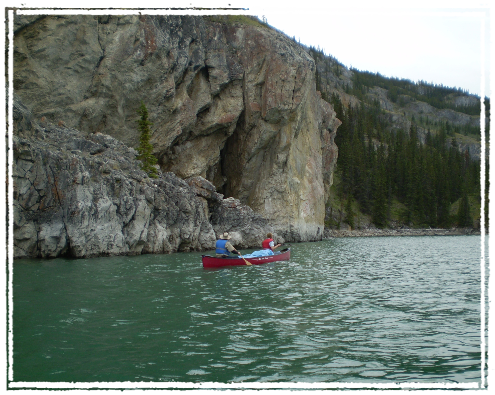Cathers Wilderness Adventures
By Pack, Paddle and Paw (11 days)
Hiking / Canoeing
This unique Yukon adventure combines a 4-day Hiking and Backpacking Trip with Pack Dogs and a 6-day Yukon River Canoe Trip from Lake Laberge to Carmacks. There is a rest day at our wilderness home and sled dog kennel in the middle of the trip, where you have a chance to see the dogs and (temperature permitting) experience a ride behind a dog team. (The dogs run in front of a 4-wheeled ATV in summer.) On the backpacking portion, we are joined by some of our sled dogs, who also help out as pack dogs in summer. The dogs carry the food and the tents so that all you carry is your personal gear. On the canoeing portion, you experience the wilderness and history of the area. The Yukon River was the route that many of the gold-seekers used on their way to the Klondike Gold Rush at Dawson City. Even after the Gold Rush, paddle-wheel steamboats continued to use the river to haul goods and passengers to and from Dawson until the 1950's. And for countless years before, the area was inhabited by First Nations people hunting and fishing along the mighty waterway. Relics and stories remain from all of these eras and you recapture the spirit of those bygone times as we paddle and drift the same areas they traveled.
Day 1
Pick up in Whitehorse. We then drive 45 minutes out the North Klondike Highway to Lake Laberge where we change to a boat for the 5 1/2 mile (9 km) trip across the lake to our wilderness home and sled dog kennel. We have a picnic lunch on arrival. After lunch, we take an afternoon hike with some of our sled dogs in the spectacular area overlooking the lake. The dogs help out as pack dogs on our backpacking trips, but today they will just join us for fun and exercise. In the late afternoon, we return home for a cook-out supper at the lakeshore. Overnight at the home cabins.
Day 2
Today we put on our backpacks and head out with the dogs to a beautiful secluded lake. The hike takes us along ridge-tops, through forests, and along little lakes. After an initial climb, it is relatively flat most of the way. All together, it usually takes about 3 1/2 hours of walking time to get to our camp, plus lunch and rest stops. Once we arrive at the lake and set up camp, you may want to take a swim or relax in camp. Or we may take a late afternoon or evening hike (without backpacks) up a hill behind the camp for a wide view over the area that we hiked through. Our first night camping supper is normally steak and potatoes and bean salad plus dessert. (Special diets can often be accommodated with advance notice.)
Day 3: Our hike takes us through beautiful Yukon scenery back down to the shores of Lake Laberge where we set up camp for the second night. If we are lucky, we may hear wolves, coyotes, or loons as we lie in our sleeping bags.
Day 4
This morning after dogs and people have had breakfast, we pack up camp and put on our backpacks for the trip back to the home cabins.
Day 5
This is a rest day at the home cabins near the lake (Lake Laberge). You may want to sit by the lake or on a hilltop and read a book or try fishing at the creek. In the evening, if the temperature is approximately 15 degrees C (60 F) or less, we will hook up a dog team for a short run (on wheels).
Day 6
We begin our canoe trip. Mostly we start right out from home by canoe, but occasionally people and canoes and gear may be transported to the north end of Lake Laberge by boat (depending on weather and group comfort). We will camp this night either on Lake Laberge or at the abandoned telegraph station and police post at Lower Laberge or somewhere a little way down the river.
Days 7 - 11
Over the next five days, we follow the Yukon River, paddling, drifting, and stopping at points of historical interest, such as the old trading post at Hootalinqua and the abandoned shipyard at Hootalinqua island where the remains of the S.S. Evelyn lie in dry dock. There are old wood camps where the paddle-wheelers picked up firewood, the old First Nations village at Big Salmon, and the abandoned cabins at Lakeview. There are possibilities of seeing moose, bears, lynx, eagles, waterfowl, and others wildlife if we are lucky. At night, we make camp on shore and fall asleep in our tents to the sound of the river in the background.
Day 11
We finish our canoeing in Carmacks where we are picked up by truck or van and returned to Whitehorse. While the canoes are being loaded, you may wish to visit the excellent First Nations museum in Carmacks. We also include a pass to the MacBride Museum in Whitehorse, for your enjoyment this evening or the following day.

